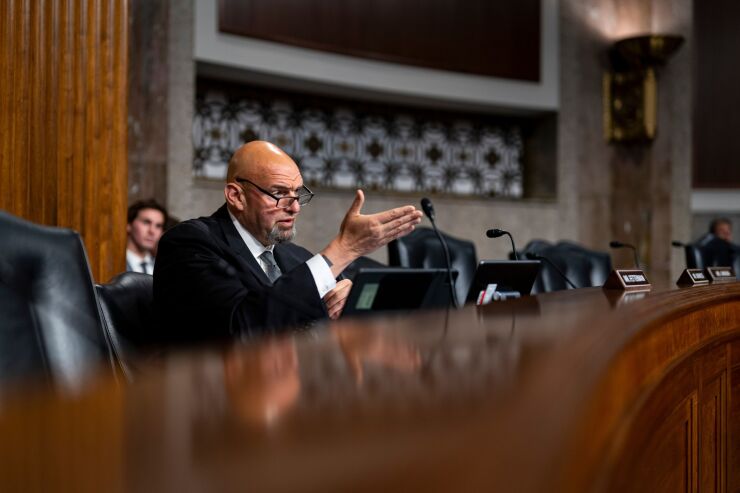
Four Democrats on the Senate Banking Committee have endorsed the Federal Reserve
Sens. Sherrod Brown, D-Ohio, Elizabeth Warren, D-Mass., Jack Reed, D-R.I., and John Fetterman, D-Pa.,
Put forth in July alongside a
The change in the reporting standard is meant to smooth out the sometimes drastic shifts from tier to tier within the GSIB capital framework, avoiding the so-called "cliff effect." As proposed, no U.S. firm would see their capital requirements altered.
Still, the senators called the move an important step to better safeguarding the financial system.
"The proposal would enhance the sensitivity and responsiveness of the surcharge to changes in an institution's risk profile and deter firms from gaming the system to lower their capital buffers," they wrote. "These banks should be using more shareholders' equity to fund their risky activities, so that they — not U.S. taxpayers — are on the hook if those bets do not pay off."
The letter from Brown, the chair of the Banking Committee, along with Warren, Reed and Fetterman represents some of the most direct and clear congressional support for the capital reform efforts currently being pursued by bank regulators in Washington.
Republicans have broadly
Thursday was the original cut-off for comments on the GSIB surcharge proposal as well as the Basel III endgame proposal and a proposal to expand long-term debt requirements to all banks with at least $100 billion of assets. But, after calls from industry groups and
Thursday was the final day to comment on potential revisions to the guidance around resolution plans, which would amend the expectations around banks that have more than $250 billion of assets but fall short of GSIB designation.
That proposal elicited concern from banking groups that were concerned about how these new guidelines might overlap with other proposed changes. This was particularly concerning for some international banks, some of which could be bumped into a higher tier of regulation because of a potential reporting change that would require them to count cross-border derivatives among their international exposures.
The Institute for International Bankers, a trade group for foreign banks with U.S. operations, wrote in its letter that it would not be fair for banks well below the size of and complexity of the GSIBs to be subjected to similar regulatory requirements. It called for a "holistic" review of how the various
"The U.S. operations of international banks are a fraction of the size of U.S. GSIBs, and guidance and expectations applicable to these U.S. operations should be much different from and much more flexible than guidance applicable to the U.S. GSIBs," the group wrote.






